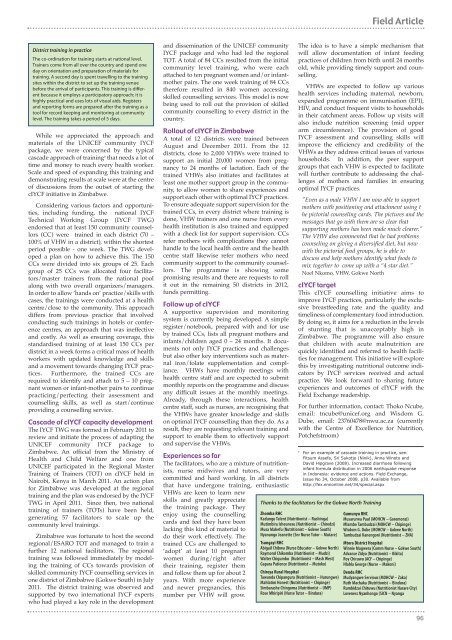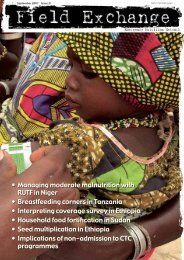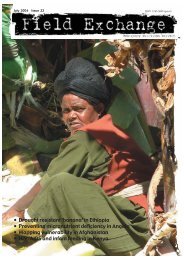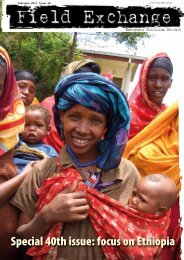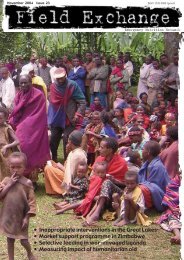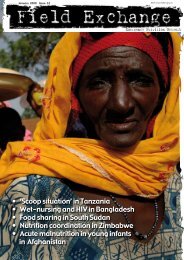Download a PDF of this issue - Field Exchange - Emergency ...
Download a PDF of this issue - Field Exchange - Emergency ...
Download a PDF of this issue - Field Exchange - Emergency ...
Create successful ePaper yourself
Turn your PDF publications into a flip-book with our unique Google optimized e-Paper software.
<strong>Field</strong> Article<br />
District training in practice<br />
The co-ordination for training starts at national level.<br />
Trainers come from all over the country and spend one<br />
day on orientation and preparation <strong>of</strong> materials for<br />
training. A second day is spent travelling to the training<br />
sites within the district to set up the training venue<br />
before the arrival <strong>of</strong> participants. This training is different<br />
because it employs a participatory approach; it is<br />
highly practical and uses lots <strong>of</strong> visual aids. Registers<br />
and reporting forms are prepared after the training as a<br />
tool for record keeping and monitoring at community<br />
level. The training takes a period <strong>of</strong> 5 days.<br />
While we appreciated the approach and<br />
materials <strong>of</strong> the UNICEF community IYCF<br />
package, we were concerned by the typical<br />
cascade approach <strong>of</strong> training 6 that needs a lot <strong>of</strong><br />
time and money to reach every health worker.<br />
Scale and speed <strong>of</strong> expanding <strong>this</strong> training and<br />
demonstrating results at scale were at the centre<br />
<strong>of</strong> discussions from the outset <strong>of</strong> starting the<br />
cIYCF initiative in Zimbabwe.<br />
Considering various factors and opportunities,<br />
including funding, the national IYCF<br />
Technical Working Group (IYCF TWG)<br />
endorsed that at least 150 community counsellors<br />
(CC) were trained in each district (70 –<br />
100% <strong>of</strong> VHW in a district), within the shortest<br />
period possible - one week. The TWG developed<br />
a plan on how to achieve <strong>this</strong>. The 150<br />
CCs were divided into six groups <strong>of</strong> 25. Each<br />
group <strong>of</strong> 25 CCs was allocated four facilitators/master<br />
trainers from the national pool<br />
along with two overall organizers/managers.<br />
In order to allow ‘hands on’ practice/skills with<br />
cases, the trainings were conducted at a health<br />
centre/close to the community. This approach<br />
differs from previous practice that involved<br />
conducting such trainings in hotels or conference<br />
centres, an approach that was ineffective<br />
and costly. As well as ensuring coverage, <strong>this</strong><br />
standardised training <strong>of</strong> at least 150 CCs per<br />
district in a week forms a critical mass <strong>of</strong> health<br />
workers with updated knowledge and skills<br />
and a movement towards changing IYCF practices.<br />
Furthermore, the trained CCs are<br />
required to identify and attach to 5 – 10 pregnant<br />
women or infant-mother pairs to continue<br />
practicing/perfecting their assessment and<br />
counselling skills, as well as start/continue<br />
providing a counselling service.<br />
Cascade <strong>of</strong> cIYCF capacity development<br />
The IYCF TWG was formed in February 2011 to<br />
review and initiate the process <strong>of</strong> adapting the<br />
UNICEF community IYCF package to<br />
Zimbabwe. An <strong>of</strong>ficial from the Ministry <strong>of</strong><br />
Health and Child Welfare and one from<br />
UNICEF participated in the Regional Master<br />
Training <strong>of</strong> Trainers (TOT) on cIYCF held in<br />
Nairobi, Kenya in March 2011. An action plan<br />
for Zimbabwe was developed at the regional<br />
training and the plan was endorsed by the IYCF<br />
TWG in April 2011. Since then, two national<br />
training <strong>of</strong> trainers (TOTs) have been held,<br />
generating 57 facilitators to scale up the<br />
community level trainings.<br />
Zimbabwe was fortunate to host the second<br />
regional/ESARO TOT and managed to train a<br />
further 12 national facilitators. The regional<br />
training was followed immediately by modeling<br />
the training <strong>of</strong> CCs towards provision <strong>of</strong><br />
skilled community IYCF counselling services in<br />
one district <strong>of</strong> Zimbabwe (Gokwe South) in July<br />
2011. The district training was observed and<br />
supported by two international IYCF experts<br />
who had played a key role in the development<br />
and dissemination <strong>of</strong> the UNICEF community<br />
IYCF package and who had led the regional<br />
TOT. A total <strong>of</strong> 84 CCs resulted from the initial<br />
community level training, who were each<br />
attached to ten pregnant women and/or infantmother<br />
pairs. The one week training <strong>of</strong> 84 CCs<br />
therefore resulted in 840 women accessing<br />
skilled counselling services. This model is now<br />
being used to roll out the provision <strong>of</strong> skilled<br />
community counselling to every district in the<br />
country.<br />
Rollout <strong>of</strong> cIYCF in Zimbabwe<br />
A total <strong>of</strong> 12 districts were trained between<br />
August and December 2011. From the 12<br />
districts, close to 2,000 VHWs were trained to<br />
support an initial 20,000 women from pregnancy<br />
to 24 months <strong>of</strong> lactation. Each <strong>of</strong> the<br />
trained VHWs also initiates and facilitates at<br />
least one mother support group in the community,<br />
to allow women to share experiences and<br />
support each other with optimal IYCF practices.<br />
To ensure adequate support supervision for the<br />
trained CCs, in every district where training is<br />
done, VHW trainers and one nurse from every<br />
health institution is also trained and equipped<br />
with a check list for support supervision. CCs<br />
refer mothers with complications they cannot<br />
handle to the local health centre and the health<br />
centre staff likewise refer mothers who need<br />
community support to the community counsellors.<br />
The programme is showing some<br />
promising results and there are requests to roll<br />
it out in the remaining 50 districts in 2012,<br />
funds permitting.<br />
Follow up <strong>of</strong> cIYCF<br />
A supportive supervision and monitoring<br />
system is currently being developed. A simple<br />
register/notebook, prepared with and for use<br />
by trained CCs, lists all pregnant mothers and<br />
infants/children aged 0 – 24 months. It documents<br />
not only IYCF practices and challenges<br />
but also other key interventions such as maternal<br />
iron/folate supplementation and compliance.<br />
VHWs have monthly meetings with<br />
health centre staff and are expected to submit<br />
monthly reports on the programme and discuss<br />
any difficult <strong>issue</strong>s at the monthly meetings.<br />
Already, through these interactions, health<br />
centre staff, such as nurses, are recognising that<br />
the VHWs have greater knowledge and skills<br />
on optimal IYCF counselling than they do. As a<br />
result, they are requesting relevant training and<br />
support to enable them to effectively support<br />
and supervise the VHWs.<br />
Experiences so far<br />
The facilitators, who are a mixture <strong>of</strong> nutritionists,<br />
nurse midwives and tutors, are very<br />
committed and hard working. In all districts<br />
that have undergone training, enthusiastic<br />
VHWs are keen to learn new<br />
skills and greatly appreciate<br />
the training package. They<br />
enjoy using the counselling<br />
cards and feel they have been<br />
lacking <strong>this</strong> kind <strong>of</strong> material to<br />
do their work effectively. The<br />
trained CCs are challenged to<br />
‘adopt’ at least 10 pregnant<br />
women during/right after<br />
their training, register them<br />
and follow them up for about 2<br />
years. With more experience<br />
and newer pregnancies, <strong>this</strong><br />
number per VHW will grow.<br />
The idea is to have a simple mechanism that<br />
will allow documentation <strong>of</strong> infant feeding<br />
practices <strong>of</strong> children from birth until 24 months<br />
old, while providing timely support and counselling.<br />
VHWs are expected to follow up various<br />
health services including maternal, newborn,<br />
expanded programme on immunisation (EPI),<br />
HIV, and conduct frequent visits to households<br />
in their catchment areas. Follow up visits will<br />
also include nutrition screening (mid upper<br />
arm circumference). The provision <strong>of</strong> good<br />
IYCF assessment and counselling skills will<br />
improve the efficiency and credibility <strong>of</strong> the<br />
VHWs as they address critical <strong>issue</strong>s <strong>of</strong> various<br />
households. In addition, the peer support<br />
groups that each VHW is expected to facilitate<br />
will further contribute to addressing the challenges<br />
<strong>of</strong> mothers and families in ensuring<br />
optimal IYCF practices.<br />
"Even as a male VHW I am now able to support<br />
mothers with positioning and attachment using t<br />
he pictorial counseling cards. The pictures and the<br />
messages that go with them are so clear that<br />
supporting mothers has been made much clearer."<br />
The VHW also commented that he had problems<br />
counseling on giving a diversified diet, but now<br />
with the pictorial food groups, he is able to<br />
discuss and help mothers identify what foods to<br />
mix together to come up with a “4 star diet.”<br />
Noel Nkomo, VHW, Gokwe North<br />
cIYCF target<br />
This cIYCF counselling initiative aims to<br />
improve IYCF practices, particularly the exclusive<br />
breastfeeding rate and the quality and<br />
timeliness <strong>of</strong> complementary food introduction.<br />
By doing so, it aims for a reduction in the levels<br />
<strong>of</strong> stunting that is unacceptably high in<br />
Zimbabwe. The programme will also ensure<br />
that children with acute malnutrition are<br />
quickly identified and referred to health facilities<br />
for management. This initiative will explore<br />
<strong>this</strong> by investigating nutritional outcome indicators<br />
by IYCF services received and actual<br />
practice. We look forward to sharing future<br />
experiences and outcomes <strong>of</strong> cIYCF with the<br />
<strong>Field</strong> <strong>Exchange</strong> readership.<br />
For further information, contact: Thoko Ncube,<br />
email: tncube@unicef.org and Wisdom G.<br />
Dube, email: 23760478@nwu.ac.za (currently<br />
with the Centre <strong>of</strong> Excellence for Nutrition,<br />
Potchefstroom)<br />
6<br />
For an example <strong>of</strong> cascade training in practice, see:<br />
Fitsum Assefa, Sri Sukotjo (Ninik), Anna Winoto and<br />
David Hipgrave (2008). Increased diarrhoea following<br />
infant formula distribution in 2006 earthquake response<br />
in Indonesia: evidence and actions. <strong>Field</strong> <strong>Exchange</strong>,<br />
Issue No 34, October 2008. p30. Available from<br />
http://fex.ennonline.net/34/special.aspx<br />
Thanks to the facilitators for the Gokwe North Training<br />
Zhomba RHC<br />
Kadungu Talent (Nutritionist – Rushinga)<br />
Mutimbira Isheunesu (Nutritionist – Chiredzi)<br />
Musa Mahefu (Nutritionist – Gokwe South)<br />
Nyanungo Jeanette (Snr Nurse Tutor – Mutare)<br />
Tsungayi RHC<br />
Abigail Chibwa (Nurse Educator – Gokwe North)<br />
Raymond Chikomba (Nutritionist – Mudzi)<br />
Walter Chigumbu (Nutritionist – Mash West)<br />
Gapara Patience (Nutritionist – Mutoko)<br />
Chireya Rural Hospital<br />
Tawanda Chipangura (Nutritionist – Hurungwe)<br />
Mahlatini Honest (Nutritionist – Chipinge)<br />
Simbarashe Chingoma (Nutritionist – UMP)<br />
Rose Mhiripiri (Nurse Tutor – Bindura)<br />
Gumunyu RHC<br />
Musarurwa Paul (MOHCW – Goromonzi)<br />
Mlambo Tambudzai (MOHCW – Chipinge)<br />
Wisdom G. Dube (MOHCW – Gokwe North)<br />
Tambudzai Kanengoni (Nutritionist – ZNA)<br />
Mtora District Hospital<br />
Winnie Magwera (Comm Nurse – Gokwe South)<br />
Advance Zidya (Nutritionist – Bikita)<br />
Roy Chiruwu (ACF – Chipinge)<br />
Hlahla George (Nurse – Makoni)<br />
Denda RHC<br />
Mudyangwe Servious (MOHCW – Zaka)<br />
Ruth Machaka (Nutritionist – Bindura)<br />
Rumbidzai Chituwu (Nutritionist Harare City)<br />
Loveness Nyanhongo (SICN – Nyanga<br />
96


